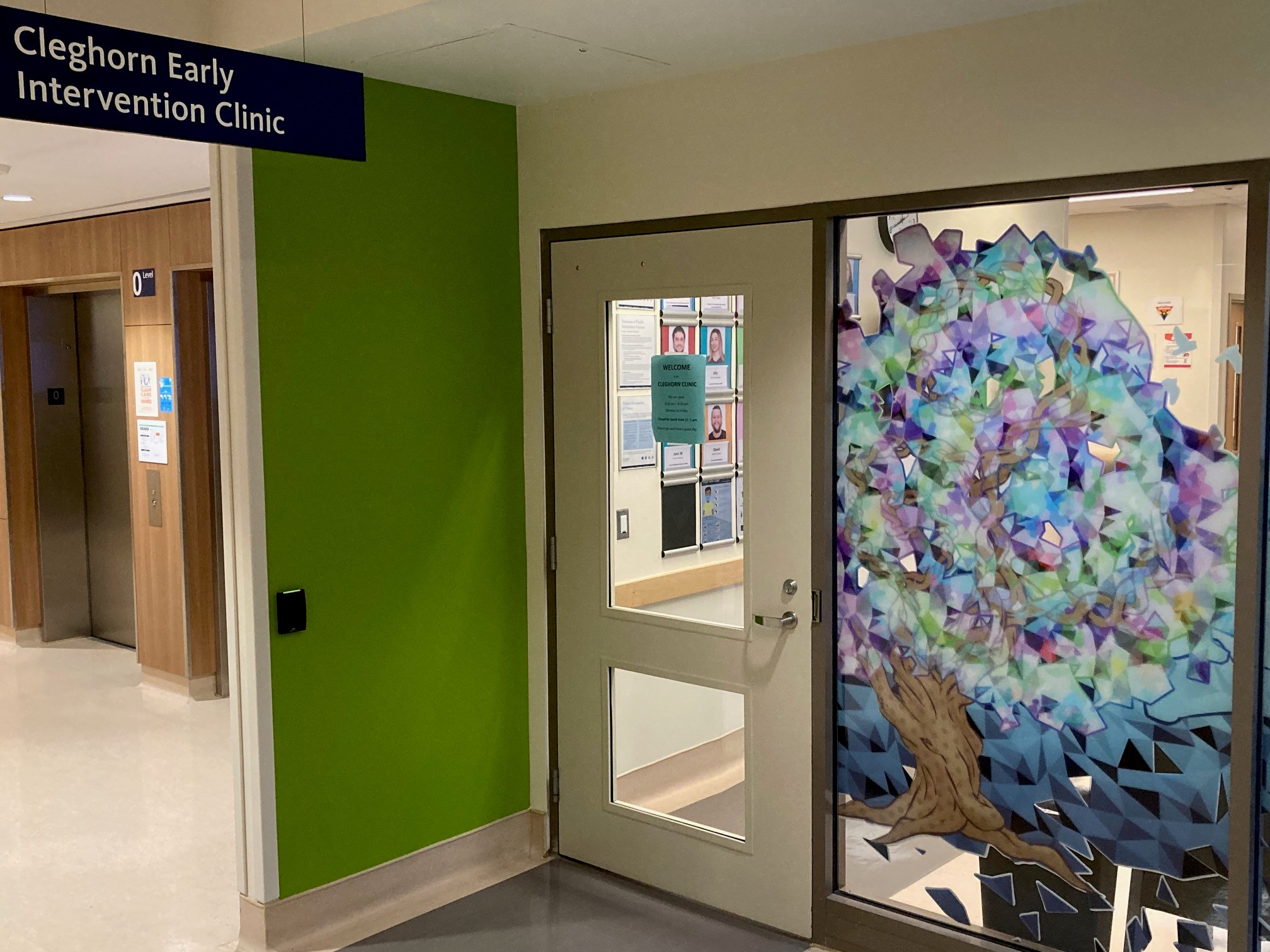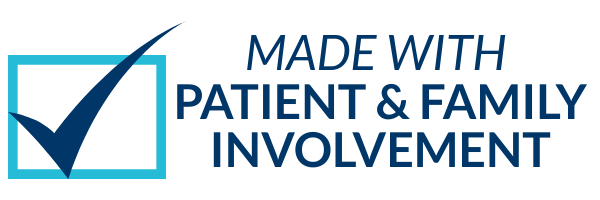

Was this page useful?
*Required FieldSJHH / Health Services/ Mental Health & Addiction Services/ Mental Health Services/ Cleghorn Early Intervention Clinic
Cleghorn Early Intervention Clinic
The Cleghorn Early Intervention Clinic is an outpatient service at St. Joseph’s Healthcare Hamilton aiming to support young people, age 16-29, recover from symptoms of early psychosis.
If you are experiencing a mental health emergency, call 9-1-1 or contact the Crisis Outreach and Support Team (COAST) at 905.972.8338 or online at coasthamilton.ca. You can also go to your nearest hospital Emergency Department. St. Joseph’s Healthcare Hamilton has Emergency Psychiatry Services at 50 Charlton Avenue East, Hamilton.
The word “psychosis” is used to describe conditions when somebody may have had some loss of contact with reality. The short video below, featuring young people who have experienced psychosis, explains it well:
Click here to access a helpful infographic from EPION.
Psychotic symptoms can include:
- Confused thinking, speaking and behavior
- Seeing or hearing things that others do not see or hear
- Strongly held beliefs that may be unusual and may not make sense to others
- Increased apathy, decreased motivation, reduced facial expression
Psychosis is more common than you might think. About 3/100 people will experience psychosis (it’s about as common as Type 2 Diabetes). It normally first occurs in younger adults (usually 16-30 years old) and occurs equally regardless of race, culture or gender.
It’s important to know that ‘psychosis’ is a symptom, not a diagnosis (like how a cough is a symptom of a pneumonia). Part of the role of Cleghorn is to help understand what may be at the root of symptoms you may be experiencing and explore ways we can help address that.
It’s also important to understand there is no one cause for psychosis there are several risk factors that can increase the risk of developing psychosis. These can include substance use, genetics, physical illness, trauma and environmental influence. Watch the video below to learn more:
Other resources:
Our mission
We understand this can be a confusing and scary time. However, many young people have come to Cleghorn feeling the same and have gone on to do amazing things.
We believe that if psychosis is detected early, many problems can be prevented. The earlier someone takes action to address the psychosis, the greater the chance of a successful recovery. We are here to support you to make choices about your recovery.

Our philosophy and values
Recovery is different for everybody. This is your recovery. We are here to help you along your path. So how you use Cleghorn, in many ways, is up to you.
- This is your journey – At Cleghorn, we offer individualized, flexible supports that are tailored to help you reach your goals and meet your needs. We want you to be an active member in your care. We want you to use your voice and exercise your choice.
- Partners in Care - Our team believes that the best model of treatment is through partnership, where you as a client and we as a treatment team work together. Your family members and others who care about you are also important partners in treatment. All partners share certain rights and responsibilities.
- Family Support – Families and other supports you might have (like friends or partners) are very important in getting well and staying well. So while we work with families to support your care, we also offer families supports as well.
- Working with the ‘whole person’ – Recovery is more than just reducing symptoms. That’s why we offer supports not only to help reduce symptoms of psychosis but also stay well overall and achieve your goals in areas like fitness, work and school, coping with stress, housing, meeting people, and connecting with your community.

- Low dose medication – Medication is often an important part of recovery but we will work with you to find the right medication at the lowest dose possible.
- Staying Connected – You live your life in the community, not at the hospital. So while we will see you at the clinic, the team can also work with you and meet you in the community. We also offer texting, virtual visits and an online portal with secure messaging, to help you stay connected to your care and your team in ways that are easy and accessible to you.
- Help with substances – We know that substance use can have negative impacts on health and recovery. We offer ongoing support to help understand, reduce or stop substance use.
- Transitional support – Cleghorn is a time-limited program that normally lasts 3 years - so you won’t be a client with us forever. It is our shared hope and expectation you will be successful in your recovery. So, from the start of care, we’ll be working with you to meet your goals and will help you in transitioning successfully from the program.
Eligibility Criteria: The Cleghorn Early Intervention Clinic is an outpatient service at St. Joseph’s Healthcare Hamilton supporting young people experiencing early psychosis, age 16-29, who have received less than one year of treatment for psychosis. Services are provided within the City of Hamilton and last 3-5 years for eligible patients. All referrals from the community are facilitated through Connect – St. Joe’s centralized referral service. The referral form can be found here
If you feel you or someone you are caring for is appropriate for Cleghorn, speak with your primary care provider, call Connect a call at 905-522-1155 x36499, or directly to the Cleghorn Clinic at 905-522-1155 x36586
Cleghorn has a whole bunch of services to offer that you can access to meet your needs in recovery. These services include individualized support with clinicians, education, advocacy and groups – both in the clinic and in your community and online.
The first visit is about 2 hours at our clinic at St. Joe’s West 5th Campus. We ask that you bring your family and supports with you if you can. When you arrive, you’ll be greeted by staff who will take ask for your health card and register you. You will then meet with a psychiatrist, a nurse care coordinator and our family educator (who will meet with you and your family). This initial meeting will be a complete assessment to develop an understanding of you, your goals and the challenges and changes you may have been facing recently. The assessment will be shared with you, and will be used to determine an accurate diagnosis, to assess if further follow-up in the program will be helpful, and to offer a recovery program tailored to your unique needs.

Throughout care, there is a number of regular (or ‘standard’) visits where we will gather medical information, understand your goals and get to know you better. You will also be asked to complete regular assessments on a variety of topics. By doing this, your care team will work with you to develop a care plan, where you can review your goals and treatment. This care plan will be shared with you and reviewed regularly. This will help us track your progress, make sure we’re meeting your targets and set you up for success when it’s time to move on.
When it’s time to move on and your goals are met, we’ll work with you and your family to support your transition from Cleghorn.
- Care Coordinators, will be your main contact throughout most of your care at Cleghorn. Care coordinators are nurses who offer ongoing nursing support and help connect you to other clinicians and services to meet your needs.
- Youth Mentor, as someone who has been through it before, the youth mentor can help provide peer support and connect with resources in your community
- Psychiatrist, is your doctor who specializes in the diagnosis and treatment of psychiatric illnesses.
- Family Educator, is the nursing specialist who works with family members by providing counseling and education
- Occupational Therapists, who offer support for your goals around school, work, increasing independence, and involvement in your community.
- Recreational therapist, who offers assistance in achieving your goals in recreation and physical fitness
- Social Worker, who can provide support in housing, finances, one-on-one counselling and transition from Cleghorn when you’re ready to move on.
- Substance Use Counsellors, who can explore the impacts substance use and.help explore ways to reduce their impact
- Psychologist, who offers specialized testing and cognitive therapies to understand and improving your memory, learning abilities, coping and overall functioning.
- Data and Research Coordinator, who administers a variety of assessments and supports client and family involvement in research projects.
- Administrative staff, who will help arrange appointments, greet you when you arrive and help support your care team behind the scenes.

Click here for directions to St. Joseph’s West 5th Campus.
Directions by BUS
The bus routes listed below stop in front of St. Joseph’s West 5th Campus.
From Downtown:
# 20 A Line Express
#21 Upper Kenilworth
#33 Sanatorium
#35 College
From Limeridge Mall:
#25 Upper Wentworth (with a transfer to #21 Upper Kenilworth)
#35 College
Visit www.hamilton.ca/HSR for detailed bus routes.
It can be very distressing to realize that someone you love is experiencing psychosis. You may feel shocked, confused, bewildered, guilty, or helpless. It may be hard to take the first step towards getting help: you may be unsure of what the problem is, or the person experiencing a psychotic episode may not realize they are unwell or want to admit to needing help. They may also need help finding out what is happening to them and what kind of treatment they require. The first step is often to visit their family physician; their doctor can then refer them to more specialized professionals - which may include Cleghorn.
If a loved one has experienced any of these symptoms, consider a supporting a referral.
- A significant change in normal personality, which lasts weeks or months
- Faster, slower, or disorganized speech that is difficult to follow
- Suspicious, guarded, or fearful behaviour
- A severe change in sleep pattern
- An inability to function at their normal level (e.g. can’t perform at school or work, neglects hygiene or personal affairs)
- A preoccupation with unusual ideas (e.g. thinks they hear God’s voice, believes coded messages are being left for them in the media)

Once referred here, we can work with young people and their families to help find a time for them to come to the clinic for their initial consult as soon as possible. If the person you are worried about is reluctant to seek help, our team will help problem solve with you and the young person to help support a pathway to care that is comfortable and supportive for all.
If you are worried about your loved one’s safety, check in on them regularly. Always take talk of suicide or self-harm seriously. If your loved one is suicidal, stay calm and offer them your support. Assure them that help is available and that things can get better, and that having the courage to seek help is a sign of strength rather than a sign of weakness or failure. If your loved one is experiencing a mental health emergency, call 9-1-1 or contact the Crisis Outreach and Support Team (COAST) at 905.972.8338 or online at coasthamilton.ca. You can also go to your nearest hospital Emergency Department. St. Joseph’s Healthcare Hamilton has Emergency Psychiatry Services at 50 Charlton Avenue East, Hamilton
Contact
St. Joseph's Healthcare Hamilton - West 5th Campus – Level 0 Outpatient
100 West 5th Street, Hamilton, ON Canada L8N 3K7
Phone: 905.522.1155 ext. 36586
Fax: 6905.525.2805


